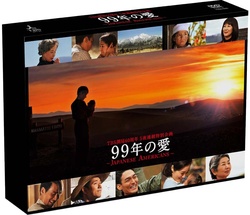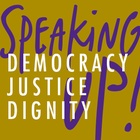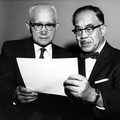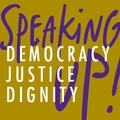(Editor's note: This article was presented in Japanese at the " 99 Years of Love/Hate" session (July 6, 2013) at the Japanese American National Museum's nationwide conference " Speaking Up! Democracy, Justice, Dignity, " held in Seattle. Please also see the presentations by Professor Iino Masako ( background to the article ) and Professor Shimada Noriko ( historical research ) in the same session.)
"99 Years of Love ~Japanese Americans~" won the Tokyo Drama Awards 2011 in the "Single Drama Category". To commemorate the award, it was rebroadcast. The viewership rating was about 12% on the first night, but gradually increased, approaching 20% on the final night, with a peak of 23.8%. Although the broadcast format, which is two hours each time and five consecutive nights, seems to be a disadvantage for achieving high viewership ratings, it can be said that it achieved a fairly high viewership rating. TBS summarized the show by saying, "The final night of the five-night special project for the 60th anniversary of the launch of TBS, "99 Years of Love ~Japanese Americans~", achieved a high viewership rating of 19.1%!! The average viewership rating for the five days, which lasted for 11 hours, was 15.4%!!" They also praised the show, saying that it was "broadcast on an unprecedented scale in the history of television, and caused great excitement," and that "this drama, which will remain in memory and record, will be a major guide for the future of the drama world."
When I searched Google for the words "99 Years of Love," "viewer ratings," and "reviews," I found a site called F-cast TV Drama Viewer Ratings and Reviews.
One person said, "My grandparents' siblings are first-generation Japanese immigrants. They are now buried in their homeland, Japan. The other day, the whole family, second and third generation, suddenly came from the US to visit the grave. They are elderly and of course cannot speak Japanese, but they made all the arrangements themselves without relying on relatives in Japan. I was moved by their vitality, generosity, cheerfulness, and the deep bond with their parents who have overcome hardships together. That reminded me of Sugako Hashida's drama "Haru and Natsu: The Letter That Could Not Be Delivered." I'm not a fan of "Wataru Seken," but if it's a drama written by Hashida as her will and starring Tsuyoshi Kusanagi, I believe it will be a wonderful work." This was probably a post from a Kusanagi fan. There were many actual responses from his fans.
On the other hand, a volunteer at the Japanese American National Museum expressed strong concerns, saying, "When the drama was announced I was really surprised, but also very worried. The stories of Japanese Americans have very complicated backgrounds, and I don't want it to be just a tear-jerker drama, nor do I want it to be portrayed in a humorous way. Second-generation Japanese Americans have Japanese faces, but they are American, not Japanese. And yet when I read the words on the official website that 'they had no choice but to live without knowing Japan,' I was disappointed that it was being made by people who knew nothing. Most second-generation Japanese people can't speak Japanese. I really wonder why Japanese people are playing the roles of second-generation Japanese people. I can't help but worry that this drama will give Japanese people the wrong impression."
I don't think the drama deals with the history of Japanese Americans in a "comic" way, but some of the points that this person was concerned about were also pointed out by students who watched the drama.
Also, in comments from people who have actually seen the drama, some were moved to tears by the heroism of the Japanese American troops. There were also voices praising the drama as a story of family love. There were almost no criticisms.
Next, I will move on to the students' reactions. I was informed that I would be making a presentation here, so I hurriedly wrote on the syllabus that I would be covering this in my classes. At Shirayuri Women's University, I am taking a semester-long course called Glocal Cultural Studies H, which is aimed at second- to fourth-year undergraduate students. The course outline is, "It has been over 140 years since the Japanese emigrated en masse to the United States, and 70 years since Japanese Americans were forcibly removed and interned in the interior of the United States following the Japan-US war. Today, the history of Japanese people going overseas to work has been forgotten, but the experience of Japanese Americans being interned has been covered by various media. This year, we will focus on Japanese Americans and consider how their experiences are being passed down, their local activities, and their global development. The main teaching materials will be visual materials created for California junior and senior high school textbooks, Hollywood movies, etc." I covered this topic twice in 90-minute classes. In the first class, I showed the historical background, and in the second class, I showed a 10-hour drama in 80 minutes. I also used the TA to show the whole thing during lunch break, and I also put the DVD in the library.
The fourth-year seminar at Tsuda University also covered this topic in two sessions, with the students learning basic concepts and theories regarding race and ethnicity, and then examining the current situation in the United States from various statistics. As a case study, they will analyze novels and video materials related to the internment of Japanese Americans, and explore the creation and transformation of ethnic identity. The first session was an 80-minute shortened screening, and the second session was a discussion. At the end of the class, students were asked to submit their impressions by the following week, which could be written impressions. Fifteen of the 32 Shirayuri students and 12 of the 16 Tsuda students submitted their impressions.
First, although the sample size is small, I will talk about the overall percentage.
The questions were written, so they covered a range of topics, but we asked them to write about what they wanted to convey to viewers in "99 Years of Love." The most common responses were about racial discrimination and the strong shock of being set on fire and nearly raped. This was followed by the struggles of Japanese Americans, followed by issues of war, family love, and the message of not giving up in the face of adversity, which were mentioned by the same number of people.
Next, in terms of the evaluation of the drama as a historical drama, the number of students who thought it was "worthy of evaluation" slightly exceeded the number of students who answered that they could not evaluate it or that they had doubts. In response to the question of how it compared to other dramas, most of the students were not familiar with dramas about Japanese Americans.
Moving on to individual opinions, perhaps because the film was covered in class, many students commented that they "learned about Japanese Americans," with some saying, "I learned a lot for the first time through this film," and "I learned more about Japanese immigrants to America and the Japanese American internment camps."
Regarding the efforts of Japanese Americans, they seemed impressed, saying, "The drama conveyed the lives of Japanese immigrants to America, such as farm managers, seasonal workers, housewives supporting their families, and students," and "I thought it was amazing to learn that the first Japanese people to live in America worked so hard, tilling vast tracts of land, making fields, and working together to make a living."
As a historical drama, he generally gave it a positive review, stating, "I think it's okay for a drama to have a few errors. This drama allowed me to learn about the past between America and Japan, and I was moved to tears," and, "Since it's fiction, I think it's okay for it to have a few errors, because I was moved by it." I had pointed out many differences from historical fact in class, so I thought there would be more critical opinions, but because it was a moving drama, it seemed to be considered a success.
In closing, some students expressed the view that, while the film includes strong scenes that incite anti-American sentiment, such as rape and horrible discrimination against "Japs," it also includes a fair number of pro-Japanese Americans and avoids making a film that is biased toward either country, so it seems to be a film that takes America into consideration.
There were also opinions that it is important to properly recognize the past, when there was discrimination, as being in the past, saying, "Leaving aside the question of whether this drama is based on fact from start to finish, it is a fact that discrimination against Japanese Americans existed. I think it is very important to look back on this past and share the facts of what happened between Japan and the United States. I believe it is because of this past and the achievements of Japanese Americans in the war that Japanese Americans and Japanese people have come to be accepted, and that relations between Japan and the United States have become friendly to this day."
The students seemed shocked by the racism and discrimination against Japanese people. However, when I read their comments, such as "Knowing that Japanese people were discriminated against as well made me think again about discrimination around the world," "It was devastating to learn that such discrimination existed against Japanese people who had American citizenship and wanted to live in America. It made me realize how cruel racism is and how much it torments the human mind and body," and "Japan is now accepting many immigrants and migrant workers. After watching the drama, we felt that the discrimination Ichiro's family suffered was terrible, but now we need to think about whether we are on the discriminatory side, and I think this drama was a very good lesson," I was moved by the students' incredible sensibility.
While some people thought the history of Japanese Americans was well portrayed, others thought it was a "success story" like Sugako Hashida's morning drama "Oshin," while others saw it as a popular drama in the same vein as "Wataru Seken."
There were also opinions that the film was made by a Japanese person, which made it seem unreasonable. Many also felt that the Japanese perspective was too strong. For example, one opinion stated, "I felt that this film was portrayed from the perspective of Japanese people who were born and raised in Japan. There were also parts that differed from historical facts, which was confusing." There was also a concern about US-Japan relations, saying, "If you don't watch it with a proper understanding that it was written and directed by a Japanese person, and is told from a Japanese perspective, I think it will only incite anti-American sentiment." The following comment was spot on: "It also seemed to include an intention to praise Japanese qualities (such as perseverance). This is because I felt that this drama was portrayed from a perspective that equates Japanese people with Japanese people."
There were also opinions that the way the second generation Japanese immigrants are portrayed is as a tragic hero, in other words a "male version of Oshin," with the protagonist portrayed as a man carrying the destiny of a second generation Japanese immigrant. I think this very portrayal leads to discrimination and prejudice against them.
Furthermore, there were also concerns that "the white characters have stereotypical personalities, and most of them are portrayed as standard villains who hate Japanese people. People who watch this drama will have a fixed image of Japanese people = victims, and white people = perpetrators." This contrasts with the opinion mentioned earlier that there are a fair number of pro-Japanese white people in the show.
Regarding the criticism that the distinction between Japanese and Japanese-Americans is unclear, some people said that the English of Ichiro, a second-generation Japanese-American, and the English of the fourth-generation Japanese-American children were poor, as they were all students of English literature. Others said that the hardworking Chokichi easily committed suicide, and that the father's feelings about Ichiro's departure for war were not depicted.
Nevertheless, some graduates have responded by emailing us with comments such as, "It is no exaggeration to say that the current Japan-US relationship exists because of the hardships that Japanese Americans faced in America," and, "It may be fiction, but the background is non-fiction. Thanks to the history that those people built through those times and their hardships, I lived in America from 1980 to 1985, and there was no discrimination, and Americans treated me really kindly, and I only have fond memories. I was shocked to learn that there was a time when there was such discrimination, and it made me realize once again how terrible war is." Some graduates said that it was thanks to the hardships of Japanese Americans that the Japan-US relationship exists today, and that it is thanks to them that Japanese people can live in America without feeling uncomfortable. So, although there are certainly some problems with the drama, I think it is significant in that it allows Japanese people to learn about the history and existence of Japanese Americans.
thank you for listening.
For more information about the Japanese American National Museum's national conference, " Speaking Up! Democracy, Justice, Dignity ," held July 4-7, 2013, please see janm.org/conference2013 .
Listen to this session's presentation (audio only) >>
© 2013 Teruko Kumei












